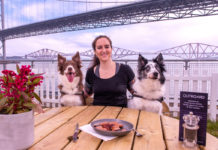Firms reckon operators can reap rewards from strong offer

From small plates and bar snacks to gin masterclasses and beer flights, today’s pubs are versatile places, so it makes sense that more and more on-trade outlets are looking for ways to diversify their offer.
With this in mind there’s no reason Scottish on-trade operators shouldn’t take full advantage of the growing coffee market, and hot beverage suppliers servicing the trade have offered their advice on how publicans can make the most of this booming drinks category.
Roger Heap, managing director of Jura UK, which supplies a range of bean-to-cup coffee machines, said that customer demand for barista-style coffee paired with “the convenience of preparing a quality drink” has “strengthened the growth and popularity” of its products.
“Coffee drinkers now favour freshly ground coffee as opposed to instant and are sampling a wider range of flavours and premium varieties as tastes become more sophisticated,” said Heap.
The on-trade should stand to benefit from coffee’s continuing growth, Heap suggested, as “out-of-home coffee consumption has risen along with coffee spend”, while consumption habits mean daytime trading is “imperative to coffee sales”, according to the Jura UK MD.
“Above all else, delivering consistent, high quality service is paramount in the hospitality sector,” he said.
Part of quality service is undoubtedly being able to provide the customer with what they want.
In this regard, Drew Steel of Ionia Espresso reckons the on-trade needs to branch out with its coffee offer to make the most of the category.
“[The] on-trade should be more flexible in its coffee menus,” said Steel.
“Offering an extra shot option to the full range of drinks can increase profits and satisfy more customers. The ‘extra shot’ is easy to offer and produce.
“There may be a place for a triple shot but if you are using a full-flavoured Italian-style roasted bean then a double should suffice, but it costs nothing to put a triple shot option on the menu for the serious coffee junkies though.”
Visibility is another key to coffee success, Steel reckons, and he offered some suggestions on how operators can ensure their hot drinks offer grabs customers’ attention.
“Keep the machine spotless and visible to the customers,” he said.
“Table menus are useful.
“Nothing beats the smell however of freshly ground coffee. Provide a decaf option for all the espresso-based coffees.”
Standing out was also highlighted as key to coffee success by Andrew Jack, head of marketing at Matthew Algie, who suggested it may be wise to add a bit of flavour to the coffee mix.
“More on-trade operators are now looking to stand out from competitors by adding flavoured syrups to their coffee offering,” he said.
“Matthew Algie’s range of ingredients offers exciting syrup flavours perfect for all seasons. For example, salted caramel, orange and hazelnut syrups are all ideal for the winter months and are a great way to add value to a simple latte or cappuccino.”
Winter is coming and that should be good news for hot drinks sales, with Jack suggesting operators make the most of the season.
“Winter is a key selling period for the hot drinks market and operators should take advantage of this by offering an exciting selection of limited edition seasonal drinks which add value to the offering,” he said.
While there’s plenty of opportunity for publicans to cash in on coffee, Jack suggested a hot beverage offer needs to be strong if it’s going to meet the expectations of today’s customers.
“Consumers have become more discerning and are demanding higher quality coffee from the on-trade,” he said.
“They are also looking for more variety in the coffees offered and an added value experience – something they cannot get at home.
“It is therefore important for operators to take advantage of this trend by offering barista-made coffees and widening the choice of blends and strengths to suit different palates.”
Roger Heap agreed that having well-trained staff is vital to coffee sales success, and suggested outlets factor in staff turnover when dedicating resources to training.
“Training is an issue where the staff turnover is high,” he added.
“In our experience it’s better to train the managers so they can pass on the knowledge to any new starts. There are a few golden rules to follow and they are not difficult to learn.”

























